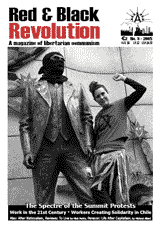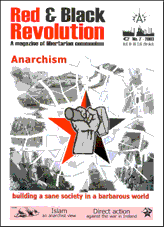Over 30 years of anarchist writing from Ireland listed under hundreds of topics
International
Book Review: To Live
For many people the 'civil war' within the Civil War that occurred in Spain between 1936-39 is a difficult business to understand. Not only were many different organisations involved, but it was set against the background of an even larger conflict that in itself was rife with brutality and betrayal. Although it appears at times to be an impossible quagmire to make sense of, Mick Parkin has succeeded admirably in his short novel To Live.
Red and Black Revolution 9
 Issue 9 of Red and Black Revolution published Summer 2005.
Issue 9 of Red and Black Revolution published Summer 2005.
The nomad, the displaced and the settler: Work in the 21st Century
Work in Ireland
After Nationalism
The Ghost of Mayday Past
Learning from May Day: Anti-Capitalist Strategy direct action, militancy and building the movement
Learning from May Day: Organisational Problems
Book Review: To Live
Book Review: Parecon: life after capitalism
Creating Solidarity in the Slums of Santiago
That's Capitalism WS78
One in eight people in prison in the 26 counties left school at age 12 or younger. Less than 17% stayed in school until age 17 or older. According to the Prison Adult Literacy Survey released in September, 52% of prisoners are functionally illiterate. Yet the government prefers the option of jailings rather than putting the necessary resources into the schools - which would doubtlessly reduce the incidence of petty and anti-social crime.
"Direct Action" by Emile Pouget and "A Day Mournful and Overcast" by an Uncontrollable of the Iron Column
A passion for freedom, opposition to all forms of hierarchy and the advocacy and use of direct action have historically been some of the most important and enduring characteristics of anarchist politics. The recent publication by the Kate Sharpley Library, of two pamphlets provides us with a glimpse of how these ideas and practices have evolved over time.
30 years of September 11th protests in Chile
September in Chile is the month of protests. It is the month where in protests and angry demonstrations throughout the country Chileans commemorate September 11th 1973, the day of Pinochets bloody (US facilitated) coup. Throughout Pinochets reign of terror September the 11th was marked by protests which were systematically and viciously repressed by the police. Although in 1990 Pinochet was forced to leave, the tradition of the September 11th protests has continued every year. This is because, despite the dictator's departure, little has in fact changed fundamentally in Chile.
The Social Forums: Abandon or Contaminate? - review of Irish Social Forum
The 'anti-globalisation' movement has sometimes been characterised as 'One No, many Yesses', meaning that while everyone disagrees with the way things are now they all have different ideas on what they would like to see replace the present state of affairs as well as on the tactics needed to get there. The World Social Forum, and the spread of social forums around the world, in some respects is a reaction to this. One of the ideas of this concept is to allow a space for dialogue for the different actors (trades unions, Non Government Organisation's, social movements etc) to try to hammer out some common ideas on how to reach the future society. However, the process has not been unproblematic and has led to controversies and to accusations that the structure and functioning of these bodies are undemocratic and unrepresentative of 'the new movement'.
Debate on 2003 Iraq war
In Workers Solidarity, No 76 August 2003, we published an article under the title "Iraq war aftermath: slaughtering democracy" by Chekov Feeney. We received a reply to this from R. Knife, an (Iraqi) Kurd living in Ireland. Unfortunately it is to long too print in full in the printed version of the paper but you can read the full text below. We also print a response from Chekov. [WSM material on the Iraq War]
What causes low wages - Unequal power, unequal pay
During the year a spate of reports have 'discovered' what a lot of workers already know - that equal pay for equal work just doesn't exist. Although legal victories and a raft of employment equality legislation have made some dents, the fact remains that discrimination on the grounds of gender, ethnicity and age (to name just a few) persists and is widespread. It seems obvious to ask: why?
Palestine and the International Solidarity Movement (ISM)
The second intifada began in September 2000 and since then over 2,500* Palestinians have been killed and 41,000 have been wounded. These stark figures alone do not tell the full story of the subjugation and the brutal oppression of the people of Palestine. The Israeli occupation forces have engaged in the systematic destruction of the infrastructure of the Occupied Territories. They regularly carry out punitive raids using explosives and bulldozers that result in residential areas being reduced to a lunar landscape of rubble.
Red & Black Revolution 7, published 2003
 Articles in this issue include a debate on the Black Bloc, a look at the failings of the Irish Anti war Movement and a piece which explores the anarchist contention that socialism cannot come without freedom
Articles in this issue include a debate on the Black Bloc, a look at the failings of the Irish Anti war Movement and a piece which explores the anarchist contention that socialism cannot come without freedom

